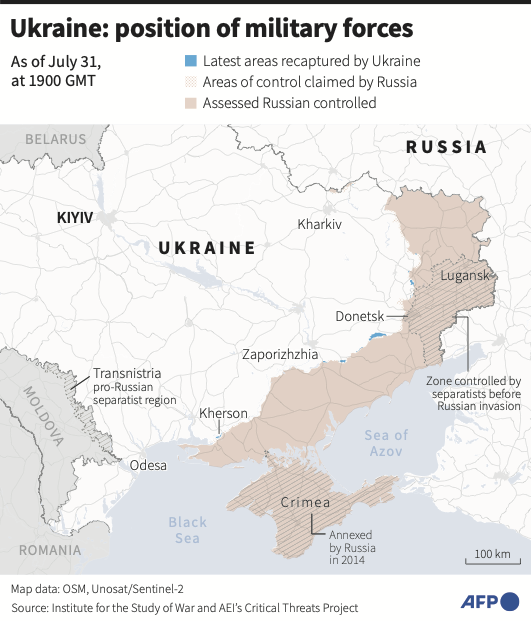KYIV: Ukraine has sunk a Russian submarine and hit a Russian airfield in the past 24 hours, in line with a surge of long-range attacks against Russian targets, officials said. Russia said Ukrainian drones also hit an apartment building, killing one person.
The uptick in attacks since July comes as Ukraine mounts pressure on allies to allow it to use long-range missiles to strike targets in Russia. Western allies, in particular the US, have so far resisted, fearing escalation from Moscow.
Ukraine struck a Russian Kilo-class submarine and an S-400 anti aircraft missile complex in the Moscow-occupied Crimean peninsula, according to a statement from the General Staff on Saturday. The air defense system was established to protect the Kerch Strait Bridge, an important logistics and transport hub supplying Russian forces.
Units of the missile forces, as well as the Navy, damaged four launchers of the Triumph air defense system, while in the port of Sevastopol, the “Rostov-on-Don” — a submarine of Russia’s Black Sea fleet — was attacked and sank, the statement said.
The General Staff also confirmed that Ukrainian forces struck the Morozovsk airfield in the Rostov region after launching a massive drone barrage on Russia. Hits were recorded in warehouses with ammunition, where guided aerial bombs were stored. The operation was carried out by the Security Service of Ukraine, the Main Directorate of Intelligence and the Defense Ministry, the statement said.

Meanwhile, Belgorod Gov. Vyacheslav Gladkov said that a woman was killed in a Ukrainian drone strike on an apartment building in the town of Shebekino early Sunday. Ukrainian drones also damaged several other buildings in the town, he said.
Gladkov said eight civilians have been wounded in the region by Ukrainian shelling and dozens of drone strikes since the previous day.
In the span of a month, Russia has experienced a surge in the tempo of Ukrainian drone barrages and long-range attacks, targeting Russian military infrastructure, including airfields and oil depots. Analysts say such an intensification is needed if Ukraine is to degrade Russian capabilities.
In anoother development, Ukraine’s human rights ombudsman, Dmytro Lubinets, said he has appealed to the International Committee of the Red Cross and the United Nations to investigate a photo that allegedly shows the body of a Ukrainian prisoner of war tortured and executed by Russian forces. He has also asked Ukrainian authorities to verify the identity of the deceased.
The photo, circulating on social media, shows the body of a person without a head or limbs. The Associated Press was unable to verify it.
“This is not just a violation of the Geneva Convention relative to the Treatment of Prisoners of War, this is the behavior of monsters,” Lubinets said in a statement on Telegram.
“We are aware of recent reports online and in the media. We take these reports extremely seriously. The way we work is to respond via relevant authorities directly and confidentially,” Pat Griffiths, ICRC Spokesperson in Ukraine, told the Associated Press on Sunday when asked about Lubinet’s request.
“Speaking generally, the law of armed conflict is clear. Prisoners of war must be treated humanely at all times,” he added.


























